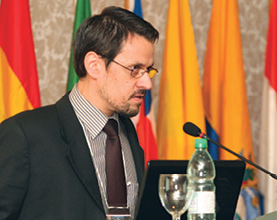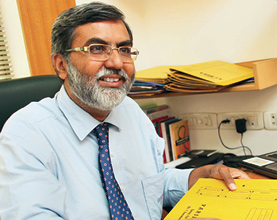Jul 02, 2012
ASCO partners with societies outside of the United States to develop skills of cancer researchers through educational workshops. These include International Clinical Trials Workshops (ICTWs) that support cancer research in economically emerging countries through the development of clinicians’ research skills in those countries. The goal of these workshops is to educate members of research teams on best practices of clinical trial implementation and join globally accepted standards in the conduct of clinical research with a local perspective. In addition to ICTWs, ASCO teams with societies to hold workshops to develop methodologies and research skills. In the interviews that follow, oncology leaders from Brazil and India share their perspectives and hopes for the upcoming workshops in their countries.
|
AC: What is the current state of clinical research in Brazil?
Dr. Mano: Conducting clinical trials is a relatively new business in our country, compared to the long track of experience in the United States. Until the early 1990s, clinical trials were virtually unknown here. Trainees had limited or no exposure to this field of science unless they undertook a fellowship abroad. However, the situation started to change in the late 1990s when pharmaceutical-sponsored trials started to pour in. This process accelerated dramatically in the last decade, to the point that a few years ago, Brazil was ranked 19th in participation in biopharma global clinical trials [Nat Rev Drug Discov. 2008; 7:13-14.]. Clinical trials units (CTU) were activated in growing numbers and are now further spreading to other regions and smaller centers. More trainees are benefiting from early exposure to clinical research, which will hopefully pay off in the long term with a new generation of well-trained oncologists interested in academic achievement.
The arrival of many industry-sponsored studies brought substantial benefits to the field of clinical sciences, which was lagging behind other areas such as basic research. Some CTUs achieved high levels of expertise and a few are now fully qualified for conducting complex trials. Many investigators and research support staff are now further disseminating their knowledge through the country. We also benefited in terms of infrastructure. Finally, resources from sponsored clinical trials now represent an additional source of income to many institutions and have resulted in many direct and indirect jobs [Lancet Oncol. 2010. 11:712-3.].
Regardless of our well-known regulatory hurdles, Brazil has given significant contributions to many international trials, as seen by the growing number of co-authorships in trials with competitive accrual. Data quality has also been favorable, in that Brazil continues to be a target for international sponsorship.
AC: What are some of the challenges faced by researchers in the region?
Dr. Mano: The bureaucracy in clinical trials activation, which leads to significant delays. This is the result of a combination of factors that start with a very strict and inflexible legislation. Often, only major pharmaceutical companies are able to cope with these incredible hurdles. Oddly enough, an academic trial that would result in no additional costs to the health system cannot take place because no treatment reimbursement would be provided. In other words, the academic clinical research has been severely affected by the current regulatory scenario—which has proven very difficult to change.
In terms of pharmaceutical-sponsored trials, our regulatory hurdles reduce our competitiveness, especially as other emerging nations in the region are doing much better. Major bottlenecks include: 1) a double, unnecessary ethics approval process (local and central institutional review boards); 2) a shortage of qualified people for this job since participation in ethics committees in Brazil is not professionalized; 3) a double process of sanitary agency (ANVISA) and central ethics (CONEP) approval (they now run in parallel, but this measure was of borderline effectiveness); and 4) a complex drug importation process.
One consequence of this inefficient process is that the vast majority of our studies are now large international phase III trials with a long lifespan, with few early-stage trials available. Equally frustrating is the fact that Latin American investigators are still viewed by many sponsors as mere recruiters to their trials, with few opportunities to contribute to the study design and planning—though this scenario is starting to change.
Another hurdle for academic researchers in Brazil is that the model employed by our public funding agencies for grants is not fully appropriate for clinical research.
Finally, qualified investigators often spend more time in private practice than clinical research because of underpayment in this area of medicine.
AC: What are some of the unique opportunities in the region, and what future do you see for clinical cancer research?
Dr. Mano: I believe clinical research has greater potential for growth in emerging nations. We have well-trained investigators and support staff, good infrastructure, and a new generation of motivated young oncologists. It is also my feeling that we can make major political progress with relatively simple measures. Once regulatory reform takes place, early-stage trials will start to pour in. We also have a flourishing biopharma industry, but its full development will require capabilities for conducting major clinical trials. Finally, the expected reforms will allow our collaborative research groups to conduct large-scale multisite trials, addressing questions that are specifically relevant to our population.
AC: What are the goals of the ICTW Brazil?
Dr. Mano: We have three goals: to discuss regulatory issues in the region and discuss proposals to improve this scenario; offer an opportunity for Brazilian and Latin American researchers to directly interact with key U.S. researchers; and create a fertile ground for future collaborations by promoting interaction between Latin American research staff and investigators.
AC: What do you see as the role for ASCO to support cancer research and care in your country and region?
Dr. Mano: We hope this is the first of many other ASCO activities in the region. Latin American oncologists are likely to play a growing role in ASCO activities and we are delighted in ASCO’s growing interest in the region. Workshops, training courses, fellowships, and exchange opportunities are all welcome initiatives. I’m also confident that as key Latin American investigators keep boosting their research curricula vitae, it will be a natural progression for them to fill the role of ASCO’s international speakers in major international meetings.
|
AC: What is the current state of clinical research in India?
Dr. Parikh: Clinical research started in India in 1993. Investigators from select academic institutions of international repute were involved throughout the first few years, including those from Tata Memorial Hospital, Mumbai, India; All India Institute of Medical Sciences, New Delhi, India; Gujarat Cancer & Research Institute, Gujarat, India; and Nizam’s Institute of Medical Sciences, Andhra Pradesh, India. It was a fantastic learning experience that led to capacity building across many centers. The culture and discipline of clinical research was fostered and we became familiar with the finer points of the International Conference on Harmonization’s (ICH’s) standards for Good Clinical Practice (GCP). Over the years, this knowledge has been transferred to a growing cadre of investigators, trial coordinators, clinical research associates, and support staff. It also led to the setting up of training institutes for clinical research professionals, mushrooming of contract research organizations (CROs), expansion of medical and clinical operations teams within sponsor pharmaceutical companies, and maturing of regulatory and ethical aspects. Over the last 15 years, the number of investigators, sites, centers, and patients enrolled has grown steadily. Today, the U.S. FDA works closely with the Indian equivalent, the Drug Controller General India (DCGI). Tens of thousands of patients are enrolled in clinical trials every year. Indian investigators are involved throughout the entire landscape—from trial design to publication. Several manuscripts in high-impact journals include investigators from India as senior authors.
However, for a country with a population of 1.2 billion, there is a tremendous scope for improvement. Keeping up with the regulatory changes, taking into consideration patient groups’ perceptions, educating the media, scaling up resources and infrastructure, and increasing our contribution to global medical knowledge are aspects that need attention.
AC: What are some of the challenges faced by researchers in the region?
Dr. Parikh: Today all of us live in a global village—with borders and barriers becoming increasingly irrelevant. However, each community, region, and ethnic group has unique traditions and customs that can result in a novel challenge for clinical research. For clinical researchers in this region, the situation is no different.
Some of the issues we have to deal with may not be seen elsewhere. For instance, India has more than 22 official (scheduled) languages—each with a unique script and alphabets (a small list compared to the 398 living languages in India!). This surely affects informed consent as well as quality of life questionnaires, but fortunately, there are eight to 10 commonly used languages that cover most of the patients. Another challenge is the “uninformed” media. Any patient on a trial that encounters problems is quickly labeled as “using patients as guinea pigs.” Hence, there has been an unmet need for the training of principal investigators and trial-related personnel in media skills. Another bone of contention is the urge of pharmaceutical sponsors to impose unnecessary duplication of documentation. Following a process for the sake of process, without contributing to the primary objective, is an overkill that sometimes defeats its very purpose. Finally, insufficient avenues for funding make it difficult to conduct investigator-initiated studies. Problems of developing countries are different from those of the western world. Without funding, initiatives from the region addressing local questions and problems fail to get off the ground.
AC: What are some of the unique opportunities in the region, and what future do you see for clinical cancer research?
Dr. Parikh: The region brings for several unique advantages. Several cancers are more common in our region, including oral cancer, cervical cancer, and hepatocellular carcinoma. Trials in such therapeutic areas will have rapid enrollment and faster answers to important questions. Shorter time to completion will also help sponsors file regulatory dossiers quicker, making it cost-beneficial to conduct such trials in our region. Availability of highly qualified and experienced principal investigators is another plus point—especially since their medical education as well as all hospital source notes are in English. The information technology expertise available in India is another added advantage.
Unique opportunities are abundant for aspects involving treatment-naïve patients, contribution to infrastructure and human resource development, as well as application of global standards to generate world class results that will shape the future of cancer management globally.
AC: What are the goals of the ASCO-ICON Cancer Research Workshop?
Dr. Parikh: Our primary objective is capacity building. At the end of the workshop, participants will know how to design and implement a clinical trial. By focusing on mid-level health care professionals and selecting participants on the basis of a concept proposal, we hope to ensure that only those showing genuine interest and commitment will have the opportunity to benefit from the workshop. The workshop will also give the national faculty an opportunity to interact with international experts, thus serving as an indirect training-of-trainers program.
AC: What do you see as the role for ASCO to support cancer research and care in your country and region?
Dr. Parikh: The oncology health care professionals community in India (and the region) is woefully inadequate for our population. Currently, we have just over one qualified oncologist per one million Indians. The situation in other countries is even worse. On the other hand, ASCO has a huge membership of experienced oncologists that are able to and have an interest in imparting high-quality training. ASCO also has a global reputation that is unparalleled. By joining hands with ICON, we can develop an oncology training program that can address all levels of oncology management—cutting edge oncology, clinical research methodology, postgraduate fellowship programs, oncology nursing, and empowering patient advocacy groups.


